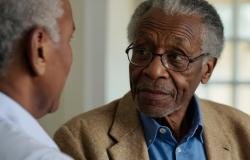Already 25 years since the year 2000. Duty takes us back in January to a quarter of a century punctuated by significant events and new trends, which still shape our society. In this article: the wars against Islamist fundamentalism.
On September 11, 2001, the West suddenly opened its eyes to concepts such as “radical Islam”, “jihadism” and even “Islamist terrorism”. Since then, wars have been fought in Afghanistan, Iraq and Libya, Islamic State positions have been bombed in Syria and Iraq, but for what results? Duty spoke with two specialists on the issue and provides here some food for thought.
“I owe my career to Osama bin Laden. » Francesco Cavatorta jokes today, but the professor in the Department of Political Science and at the Higher School of International Studies at Laval University knows that, without the former leader of al-Qaeda, his professional career would have been any other. Since September 11, 2001, he has devoted his career to Islamist movements, to the study of political and radical Islam, and, more broadly, to geopolitics in the Arab-Muslim world.
That day, the global chessboard shifted at the speed of two airliners flying into office towers. Having just emerged from 50 years of the Cold War, the West — at least, the general public — was discovering Islamist terrorism. And he was going to launch a war against a new enemy who had the impudence to hit American imperialism in the heart: Islamist fundamentalism.
“In the 1990s, researchers like Benjamin Barber already predicted that the losers of globalization would find a way to respond to the challenges that make them losers, with a return to tribalism, very exclusive nationalism and religion. All the losers, whoever they were, were going to come back to identity factors: ethnicity, clan, religion,” summarizes Francesco Cavatorta.
September 11 will crystallize this state of affairs, as will the Hamas terrorist attacks which, on October 7, 2023, will cause 1,200 victims and nearly 250 hostages in Israel.
From one September 11 to another
For Rachad Antonius, retired full professor in the Department of Sociology at UQAM and in solidarity with the Palestinian cause, the real common point between October 7 and September 11 lies in the fact that each of the events represents the result of history, and not its starting point. And according to him, the structuring effect is to be found in the colonial relationship with, as a starting point, the oil shock of 1973 for September 11, and the creation of the State of Israel in 1948 for October 7.
The sociologist recalls that September 11 was born from the collapse of secular nationalist movements in the Middle East in the 1970s and the West’s support for radical Islamist movements. This new political situation coincided, according to him, with the advent of Saudi Arabia which, thanks to the oil crisis of 1973 and the financial windfall it generated, became a new regional power and an essential player on the chessboard. global.
“For 30 years, Saudi Arabia, supported by the United States, worked to make Islam the core of the dominant political ideology in the region. September 11 was born from that,” explains Rachad Antonius.
The roots of October 7 are also linked to a colonial power struggle, according to him, with the creation of the State of Israel as a backdrop.
“The overwhelming majority of Gaza residents are either 1948 refugees or descendants of 1948 refugees. For them, the Nakba [« la catastrophe » désigne l’exode des centaines de milliers de Palestiniens lors de la création de l’État d’Israël]it’s not the past, it’s the present,” explains the specialist in Arab societies and conflicts in the Middle East.
Rachad Antonius also evokes the violence suffered by the Palestinians since 1948 as well as the marginalization by the Jewish state of peaceful Palestinian movements, to try to explain the Hamas attacks of October 7, 2023.
What result for the war on terrorism?
Since September 11, 2001, the West has carried out several military operations against the jihadists of al-Qaeda or the Islamic State in Afghanistan, Iraq, Libya, Syria… with very limited results.
“From a physical point of view, we are perhaps safer, in the sense that the police and security services, in train stations, airports, through video surveillance systems, etc., have really entered in our lives,” says Francesco Cavatorta, of Laval University.
However, notes the researcher, if it is relatively simple for a Western power to overthrow the regime of a less developed country, creating a healthy democracy there is a completely different story.
“The war in Iraq [2003-2011] was tragic for the Iraqis, who are today led by corrupt elites. Have we improved their situation? This idea of a war against terrorism, of a war against a concept, is particularly complicated, especially when we don’t have a clear idea of what we want to do next,” says Mr. Cavatorta.
In Western societies, this war against radical Islam has also left its mark on our living together.
“We have become more polarized, more suspicious, harsher towards each other, less inclined to take a step towards each other. This dynamic does not make a society safer, but more schizophrenic. It’s true in our Western societies, it’s also true in the Arab world,” he explains.
The construction of Islamophobia
If Mr. Antonius points to colonialism as the common cement of September 11 and October 7, he deplores that resistance to this colonialism has taken “obscurantist religious forms”. According to him, it is this intransigent Islam with modernity that has since fueled Islamophobia. Because by finding itself linked to the question of immigration, Islamist fundamentalism and its perception in Western societies have become a security and identity issue. Polarizing.
“In Quebec, Arab-Muslim immigration in the late 1990s and early 2000s wanted to affirm all appearances of Islam publicly. However, there is a part of this immigration which believes that secularism does not suit them. What then happens in the imagination? A fusion between these two phenomena: the images of religious conservatism brought by immigration and the images of political Islam, including in its violent forms… This is where the veiled woman becomes a danger,” explains the sociologist.
And it is from this fusion which takes place from September 11 that the amalgam at the origin of Islamophobia is born, well maintained by certain media figures and certain political speeches.
“Amalgamation is inevitable when we seek confirmation of our prejudices in others,” says Francesco Cavatorta. We always seek, to justify ourselves, the most extremist voices in the Other to show that the Other is like that and entirely like that. The problem with our politicians is that they have made this amalgam something profitable at the electoral level. »
For Rachad Antonius, this amalgamation also lies in the word “Islamophobia”, which would mislead and deeply fuel racism. To fight against growing Islamophobia in Western societies, according to him, we should even ban the term “Islamophobia” and instead favor the term “anti-Muslim racism”.
“Islam is a religion, but also a conception of social order. It is the source of a political ideology. It is entirely legitimate to fear this political ideology. So, if we name the legitimate fear of a political ideology and the irrational hostility towards Muslims with the same word, we are off to a bad start,” concludes Mr. Antonius.






